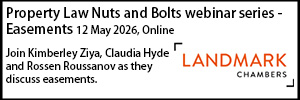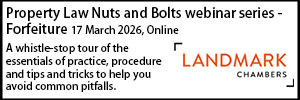Delegating negotiation of s.106 agreements to officers
- Details
Sarah Sackman examines the guidance given by the Court of Appeal on the approach to Members’ delegation to officers to negotiate s.106 Agreements.
In Flynn, R (On the Application Of) v The London Borough of Southwark Council & Anor [2021] EWCA Civ 827 the Court of Appeal handed down judgment for the Respondents in this challenge to the grant of planning permission for the major redevelopment of the Elephant and Castle. The scheme will deliver almost 1000 new homes of which 116 will be for social rent.
The challenge, brought by Jerry Flynn of the 35% campaign group, focussed on the delivery social housing and on the issue of the scope of members’ delegation to officers to negotiate a s.106 agreement needed to deliver the social housing.
For planning lawyers, the main point of interest is what the Court had to say about the relationship between the resolution to grant, the officer’s report to committee and the scope of the delegation from members to officers to negotiate s.106 agreements (paras. 41-46). Although the Court of Appeal stressed that no novel point of law arose, the decision provides useful guidance on the approach to be taken to construing the members’ delegation of legal authority to officers.
The Court found:
- The instrument of delegation rested in the resolution itself and only there (para. 49).
- Whilst the officer’s report containing members reasons for resolving to grant permission provide the context for resolutions they are not the instrument of delegation. Members reasons do not “dictate how [s.106] negotiation must be conducted (J46).
- If members want to stipulate the specific content of planning obligations which are needed to make the development acceptable then such provision needs to feature expressly in the wording of the resolution to grant itself (para. 47).
- Officers reports – whether being looked to to understand the scope of delegation or the reasoning - must not be read with “undue legalistic [rigour]”, but – in the way this court suggested in Mansell – “with reasonable benevolence, and bearing in mind that [it is] written for councillors with local knowledge”. That principle not confined merely to cases where an error in the officer’s advice is alleged (para. 48).
The provision of additional social rented homes had been a critical factor in the decision to grant planning permission. The social rented homes were made possible by what members were originally told in the officer’s report was “confirmed” grant funding. That was then amended to indicate the developer had funding that was “agreed in principle”. Lindblom LJ found the reference to an “agreement in principle” was an “overstatement”. In fact no such funding had been agreed in principle between the GLA and the developer Delancey who had merely been invited to make a bid to the GLA (para. 87). However, the court held the statement was not materially misleading since the developer was offering the additional social housing unconditionally, irrespective of the grant funding. Without the grant, the viability of the development and its ability to deliver the proposed social housing “would have been less robust” but that did not mean the members had been misled (para. 91).
Sarah Sackman is a barrister at Francis Taylor Building. She was led by David Wolfe QC and acted for Jerry Flynn of the 35% Campaign, instructed by Paul Heron Public Interest Law Centre.
Sponsored articles
Walker Morris supports Tower Hamlets Council in first known Remediation Contribution Order application issued by local authority
Unlocking legal talent
Senior Solicitor - Property
Legal Director - Government and Public Sector
Legal Officer
Locums
Poll














































